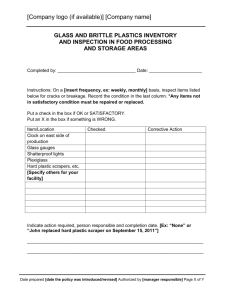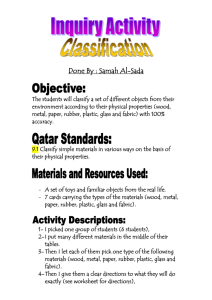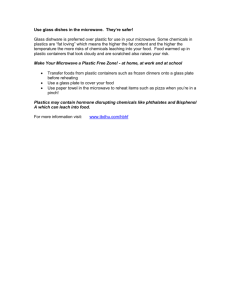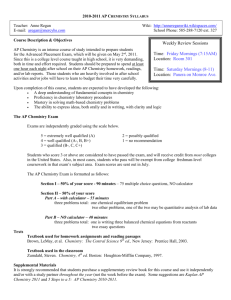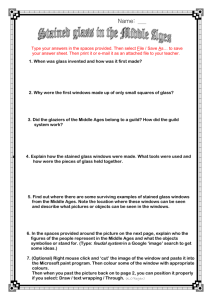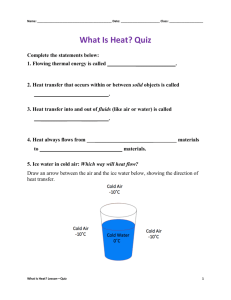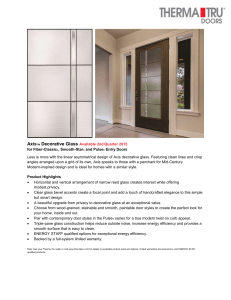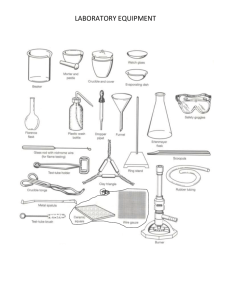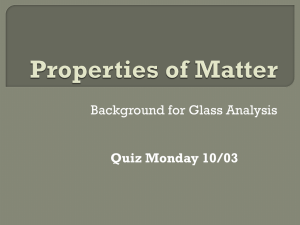Laboratory Equipment
advertisement
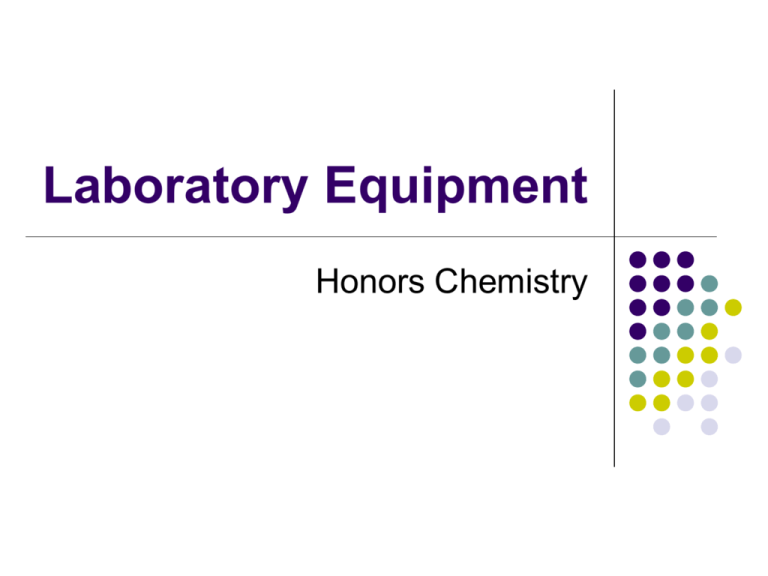
Laboratory Equipment Honors Chemistry Safety Goggles!!! Safety Goggles Plastic Must be worn at all times while working in the laboratory Beaker and Beaker Tongs Beaker Glass or plastic Common sizes: 50 mL, 100 mL, 250 mL, 400 mL Glass beakers may be heated Beaker Tongs Steel For handling hot beakers, crucibles, etc. Jaws are plastic covered for firm gripping. Buret and Buret Clamps Buret Glass Common sizes: 25 mL and 50 mL Used to measure volumes of solutions for titrations. Buret/Test Tube Clamp Round, plastisol-coated jaws Attaches to ring stand and used to support a test-tube or buret during lab Double Buret Clamp Steel Attaches to ring stand and used to support two burets during titrations Ringstand, Ring Clamp and Wire Gauze w/ Ceramic Square Ringstand Metal rod fixed upright in a heavy metal base Has many uses as a support Ring Clamp Made of chrome-plated cast iron Heavy support ring Attaches to ringstand Wire Gauze w/ Ceramic Square Ceramic fiber center Used to spread the heat of a burner flame Crucible w/ Cover, Clay Triangle, and Crucible Tongs Crucible w/ Cover Porcelain Used to heat small amounts of solid substances at high temperatures. Clay Triangle Wire frame with porcelain supports Used to support a crucible Crucible Tongs Iron and Nickel Used to pick up and hold small items Ceramic Square, Condenser and Forceps Ceramic Square Ceramic Used under hot apparatus or glassware Condenser Glass Used in distillation procedures Forceps Metal Used to hold or pick up small objects Erlenmeyer and Florence Flasks Erlenmeyer Flask Glass Common sizes: 100 mL & 250 mL May be heated Used in titrations Florence Flask Glass Common sizes: 125 mL, 250 mL, 500 mL May be heated Used in making and for storing solutions Dropper Pipet, Graduated Pipet, Volumetric Pipet and Pipet Bulb Dropper Pipet Glass tip with rubber bulb Used to transfer small volumes of liquids Graduated Pipet Glass Common sizes: 10 mL, 25 mL Used to measure solution volumes Less accurate than volumetric pipet Volumetric Pipet Glass Used to measure solution volumes accurately Must not be heated Pipet Bulb Rubber Used in filling a graduated or volumetric pipet with a solution. Evaporating Dish, Mortar & Pestle and Watch Glass Evaporating Dish Porcelain Used to contain small volumes of liquid being evaporated Mortar & Pestle Porcelain May be used to grind crystals and lumpy chemicals to a powder Watch Glass Glass Used to cover an evaporating dish or beaker Funnel, Graduated Cylinder and Plastic Wash Bottle Funnel Glass or plastic Common sizes hold 12.5 cm filter paper Used for filtering or pouring Graduated Cylinder Glass or plastic Common sizes: 10 mL, 50 mL, 100 mL Used to measure approximate volumes Must not be heated Plastic Wash Bottle Flexible plastic Squeeze sides to dispense water Gas Burner, Rubber Tubing and Pinch Clamp Gas Burner Metal Connected to a gas supply with rubber tubing Used to heat chemicals in beakers, test tubes and crucibles Rubber Tubing Rubber Used to connect apparatus so as to transfer liquids or gases Pinch Clamp Metal Used to block off rubber tubing Should not be used with tubing connected to gas burner Scoopula, Spatula and Stirring Rod w/ Rubber Policeman Scoopula Metal Used to transfer solid chemicals Larger capacity than spatula Spatula Metal Used to transfer solid chemicals Stirring Rod w/ Rubber Policeman Glass with rubber sleeve Used to stir, assist in pouring liquids, and for removing precipitates from a container Test-tubes, Test-tube Rack and Test-Tube Holder Test-Tubes Glass Used to hold various substances during lab May be heated Various sizes available Test-Tube Rack Wood or plastic Holds test tubes in a vertical position Test-Tube Holder Spring metal Used to hold test tubes or glass tubing Test-tube Brush, Rubber Stopper, Thermometer and Triangular File Test-Tube Brush Bristles with wire handle Used to scrub small diameter glassware Rubber Stopper Many sizes Generally used in test tubes and flasks Thermometer Mercury or alcohol in glass Common range -10°C - 110°C Triangular File Metal Used to scratch glass tubing prior to breaking a desired length Situation 1 Can you identify all of the equipment present in this set-up? What might this set-up be used for? Situation 2 Can you identify all of the equipment present in this set-up? What might this set-up be used for? Situation 3 Can you identify all of the equipment present in this set-up? What might this set-up be used for? Situation 4 Can you identify all of the equipment present in this set-up? What might this set-up be used for? Situation 5 Can you identify all of the equipment present in this set-up? What might this set-up be used for? Situation 6 Can you identify all of the equipment present in this set-up? What might this set-up be used for?
